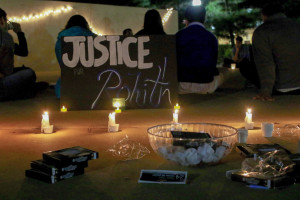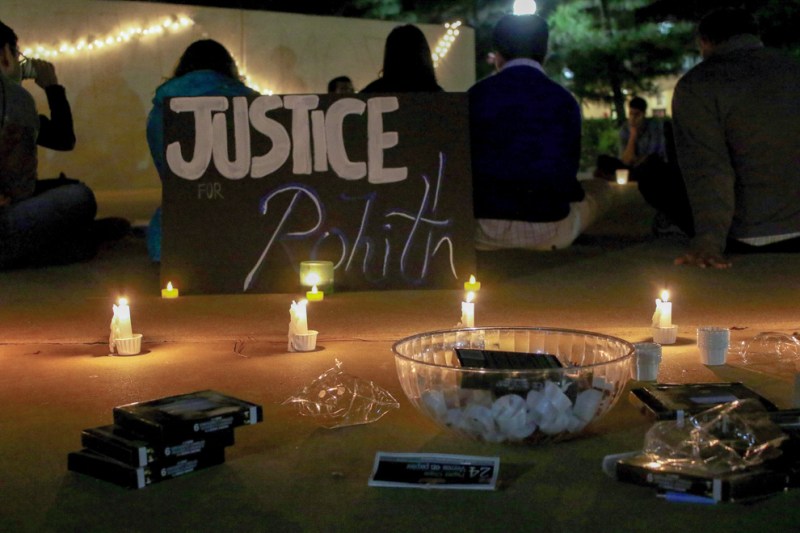On the evening of Jan. 27, Stanford students and community members gathered in White Plaza to mourn the death of Rohit Vemula, a student at the University of Hyderabad in India who committed suicide earlier this month. Vemula was a Dalit, a member of a lower caste in India that suffers from discrimination and oppression. Attendees of the vigil and the subsequent teach-in in White Plaza discussed the caste system in India and oppression of Dalits in particular.
“I read the news, and just learning more and more about Rohit Vemula’s death made me feel like I had to do something…at least the little bit that I could do being at Stanford,” said Sadhana Senthilkumar ’18, one of the organizers of the vigil. “So I emailed…the head of Sanskriti, and they helped put everything together.”
The vigil started off with Senthilkumar reading a poem she wrote about Vemula’s death. Other speakers gave histories of the Dalit movement and spoke about their own experiences within the caste system. Besides Senthilkumar, representatives from Stanford included Vivek Narayan, a Ph.D. student researching caste discrimination, and Yeji Jung ’18 and Sammie Wills ’16, members of the Stanford Asian American Activism Committee who read a statement of solidarity.

Members of the greater Bay Area community were also present at the vigil. Representatives from the Organization for Minorities in India, the Indian American Muslim Council, Jai Bhim International and the Association for India’s Development all spoke at the vigil, as well as Benjamin Kalia, an activist for Dalit rights who lives in the Bay Area.
Senthilkumar felt that it was important for Stanford to participate in the international conversation that erupted after Vemula’s death.
“A show of solidarity from everywhere is really important,” Senthilkumar said. “The privilege that comes with being at Stanford is a good way to use that in a positive manner.”
“When we started planning [the vigil], we didn’t know that so many people from the Bay Area would be interested in coming,” Senthilkumar said. “It was really great to see so many people, and I think the event was able to bring together a lot of people who are interested in the same issues.”
Sathula Bathula, an IT worker in the Bay Area, said that in his experience many Indian émigrés to America attempt to hide their caste status. He appreciated the large showing at the vigil last Thursday, and was surprised that so many people showed up “to liberate this caste bondage.”
Professor of religious studies Linda Hess, who specializes in South Asia, attended the event and expressed surprise at the attendance as well.
“To see this meeting of students concerned about Dalit issues and about this atrocity that has become such a big story in the world is very encouraging to me,” Hess said. “I’ve been at Stanford for 20 years and teaching about India and South Asia, and for many of those years there was very, very little consciousness of caste and Dalit issues.”
“I was extremely happy with the turnout, and then I was really happy that so many people from the community, not just Stanford, came and spoke about this issue in solidarity,” Senthilkumar said. “It was nice to both collectively mourn his [Rohit’s] death and at the same time recognize what we can do in the future to improve the situation in India.”
Senthilkumar was very happy with the response from parts of the Stanford community that isn’t typically engaged with these issues.
“Students at Stanford have been very supportive,” Senthilkumar said. “Many of my friends who showed up [at the event], who didn’t know very much about the caste system in India, were super willing to listen and learn.”
According to Hess, while students have usually heard about Gandhi, fewer people are knowledgeable about someone like Bhimrao Ramji Ambedkar, the writer of the Indian constitution and a Dalit scholar who critiqued the caste system. However, Hess said, that is changing.
“I used to ask [students]…how many people have heard of Ambedkar?” Hess said. “Often it would be nobody or just one person. I’m so glad to see that at this moment in history, many people are really well informed on this or come to a meeting like this with posters of Ambedkar and know what they’re talking about.”
Participants in the vigil hope that it won’t be a one-time event. Hess is hosting several events over the next month, and according to Senthilkumar, Narayan is considering starting an Ambedkar reading group.
“A lot of people from the Bay Area who came expressed interest in engaging with us in the future,” Senthilkumar said, expressing her hope that this would lead to more dialogue between students and the community.
Hess also stressed the importance of further action on this subject.
“I hope that we faculty and students and community can also join forces and continue the conversation,” Hess said.
Contact Sarah Wishingrad at swishing ‘at’ stanford.edu.
